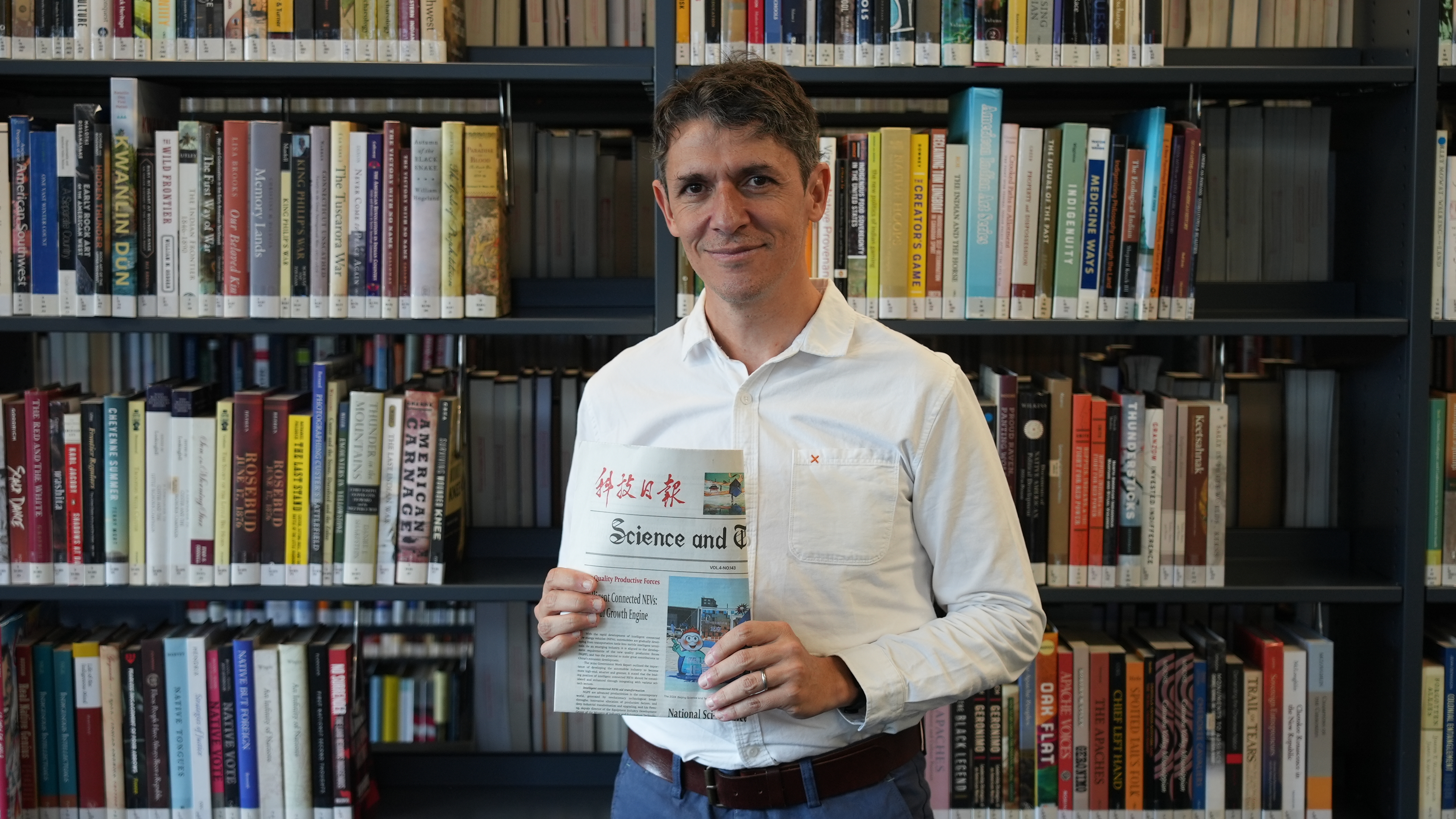By?LONG?Yun?&?ZHONG?Jianli

Professor Enrico Marsili. (PHOTO: SCIENCE AND TECHNOLOGY DAILY)
In 2023, the "World's Top 2% Scientists" list published by Stanford University recognized 21 scholars from the University of Nottingham Ningbo China (UNNC) in the single-year database and eight in the career-long database. Among these distinguished scholars is an Italian scientist, Enrico Marsili, currently Associate Professor in Green Chemicals and Energy at the China Beacons Institute of UNNC, who is included on both lists.
Known for his kindness and passion for research, Marsili is a popular figure in his school and the academic community.
To be a scientist
From a young age, Enrico Marsili was captivated by the world of science. "I became interested in science when I was in high school. I wanted to contribute to the progress of humanity," he recalled. As fate would have it, Marsili found his career path in engineering at a very young age.
"The thing I like about science, and being a scientist, is that we work and live at the edge of knowledge. We have the privilege of generating new information every day, something that you cannot find yet in books or papers," said Marsili.
At the same time, his aspiration extends beyond discovery and he dreams of seeing on the market products that he designs, thus benefiting a large number of people through his research.
Tangible benefits
Today, Marsili's research mainly focuses on biofilms and biofilm electrochemistry. He describes biofilms as microstructured communities of microorganisms that function like a city, cooperating and building their environment using biomaterials they produce.
These biofilms are crucial for environmental processes like digestion, water treatment and purification, and nutrient cycling, but can be harmful when they cause antibiotic-resistant infections in patients. "Sixty to 80 percent of infections are caused by biofilms, and among them, some can end people's lives," said Marsili, highlighting the importance of his work in both environmental and biomedical fields.
Biofilm electrochemistry, one of his research focuses, involves using electrochemical signals to study microbial communities. Marsili finds this intersection of electricity and biology particularly fascinating, as it opens up new ways to sense, characterize, and remove harmful biofilms, especially in medical settings. He is quite convinced of the potential of his work to bring about significant advancements in health and environmental sciences.
Science has no borders
"Do we need to cooperate? Do we want to cooperate?" are questions that inform Marsili's outlook. "The answers are yes and yes," he said emphatically.
Firmly believing in the necessity of international cooperation in science, he said that global challenges, which include things like the transition to renewable and sustainable energy, understanding and mitigating climate change, and dealing with an aging population, require all the human beings available on the planet to be involved.
While acknowledging the tensions and obstacles in international collaborations, he nevertheless emphasized the importance of overcoming them to fulfill the mission of improving the world through scientific methods and research.
"Science has no borders. As long as we speak a common language, whether it's mathematics, physics, English, or the language of images, what matters is that we are able to collaborate," said Marsili.
The ease of communication in today's digital world, compared to the past, facilitates these collaborations, allowing scientists to share data quickly and work together effectively.
The beginning of his China story
Marsili's journey to UNNC began with a fascination for Asian culture, sparked during his time in Singapore. "Singapore was my first Asian country, but most people there speak Chinese and have a Chinese background. So, I became fascinated with Asian culture, particularly Chinese culture, and I just wanted to know more [about it]," he said.
This curiosity, coupled with the desire to live closer to his wife's family in Thailand, led him to seek employment opportunities in China.
When the opportunity at UNNC arose in 2022, Marsili was quick to seize it. He was particularly drawn to the fact that his new environment focused on research, providing ample stimulus to solve problems and improve people's lives.
The international community at UNNC and the support from the administration have facilitated his collaborations with Chinese colleagues and students, making his work transition smooth and productive.
"Something is moving very well [at UNNC] in terms of people, which is the most important part of research, because we are [all] human. Getting together [with colleagues and students], I have had a fantastic time here," said Marsili.
Witnessing China's progress
Marsili lauds China's efforts in promoting international cooperation, particularly through facilitating international travel and open exchange formats. "International cooperation means putting several scientists in the same room, giving them enough coffee, and waiting until they do something interesting" he quipped, underscoring the importance of creating environments where scientists can freely collaborate and innovate.
Reflecting on China's progress in science and technology, Marsili is particularly impressed by the country's advancements in electric vehicles, big data, and communication technologies. "China is undoubtedly the current global leader in electric vehicles and will be so for a long time, because it has established a vertical supply chain from the minerals used in batteries up to the manufacture of electric vehicles," he said.
Returning to the issue of research, Marsili said he is impressed with China's robust research environment, highlighting the ease of communication and the extensive investment in quality research and researchers.
China's supportive ecosystem, combined with its commitment to advancing science, makes it an ideal place for researchers like Marsili to thrive.
The trio will conduct a series of experiments in fields such as life science, fluid physics, combustion science and materials science. Notably, this is the first time that fruit flies have been taken on a Chinese space mission as experimental subjects. What made scientists choose fruit flies? What experiment will they undergo?
